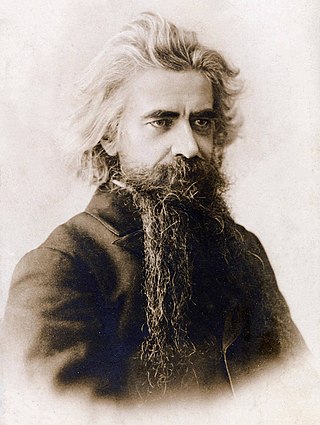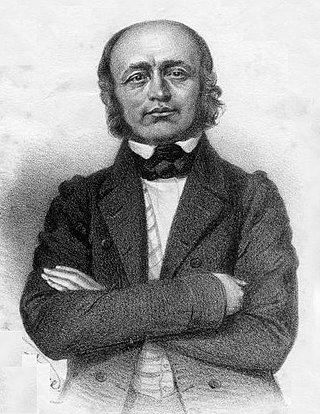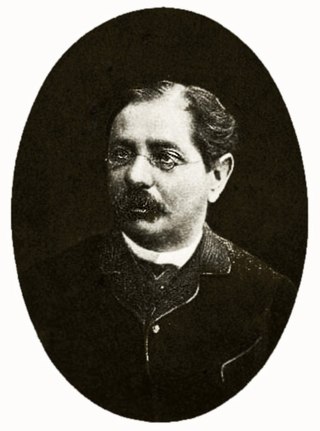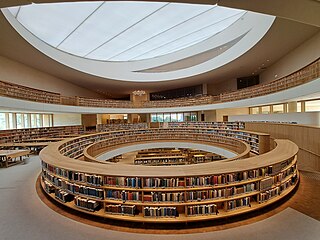
Yiddish is a West Germanic language historically spoken by Ashkenazi Jews. It originates from 9th century Central Europe, providing the nascent Ashkenazi community with a vernacular based on High German fused with many elements taken from Hebrew and to some extent Aramaic. Most varieties of Yiddish include elements of Slavic languages and the vocabulary contains traces of Romance languages. Yiddish has traditionally been written using the Hebrew alphabet; however, there are variations, including the standardized YIVO orthography that employs the Latin alphabet.

Zionism is a nationalist movement that emerged in late modern Europe in the 19th century to enable the establishment of a homeland for the Jewish people in Palestine, a region roughly corresponding to the Land of Israel in Jewish tradition. Following the establishment of the modern State of Israel, Zionism became an ideology that supports the development and protection of the State of Israel as a Jewish state.

Obadiah ben Abraham of Bertinoro, commonly known as "The Bartenura", was a 15th-century Italian rabbi best known for his popular commentary on the Mishnah. In his later years, he rejuvenated the Jewish community of Jerusalem and became recognised as the spiritual leader of the Jews of his generation.

Vladimir Sergeyevich Solovyov was a Russian philosopher, theologian, poet, pamphleteer, and literary critic, who played a significant role in the development of Russian philosophy and poetry at the end of the 19th century and in the spiritual renaissance of the early 20th century.

Isaac Erter was a Polish-Jewish satirist and poet of the Galician Haskalah. His Hebrew prose has been compared to that of writers Heinrich Heine and Ludwig Börne.
Boris Mikhailovich Eikhenbaum was a Russian Empire and Soviet literary scholar and historian of Russian literature. He is a representative of Russian formalism.
Boris Sokolov, is a historian and a Russian literature researcher. In 1979 he graduated from the department of geography of the Moscow State University, specialising in economic geography. His works have been translated into Japanese, Polish, Latvian and Estonian. He has also translated literary works from various languages.

Samuel Joseph Fuenn, also known as Rashi Fuenn and Rashif (רשי״ף), was a Lithuanian Hebrew writer, scholar, printer, and editor. He was a leading figure of the eastern European Haskalah, and an early member of Ḥovevei Zion.
The accusation that Joseph Stalin was antisemitic is much discussed by historians. Although part of a movement that included Jews and rejected antisemitism, he privately displayed a contemptuous attitude toward Jews on various occasions that were witnessed by his contemporaries, and are documented by historical sources. In 1939, he reversed Communist policy and began a cooperation with Nazi Germany that included the removal of high-profile Jews from the Kremlin. As dictator of the Soviet Union, he promoted repressive policies that conspicuously impacted Jews shortly after World War II, especially during the anti-cosmopolitan campaign. At the time of his death, Stalin was planning an even larger campaign against Jews. According to his successor Nikita Khrushchev, Stalin was fomenting the doctors' plot as a pretext for further anti-Jewish repressions.
Meyer Waxman was an Imperial Russian-born American rabbi, historian, and scholar. He best known for his six-volume work A History of Jewish Literature, published in 1960.
Pavel Vyacheslavovich Gusterin is a Russian orientalist.
Anatoly Aleksandrovich Yakobson was a literary critic, teacher, poet and a central figure in the human rights movement in the Soviet Union.

Lev Levanda was a Russian author, belletrist, and publicist. His sketches were often published under the pen name Ladnev.
The anti-cosmopolitan campaign was an anti-Western campaign in the Soviet Union which began in late 1948 and has been widely described as a thinly disguised antisemitic purge. A large number of Jews were persecuted as Zionists or rootless cosmopolitans.
Boris Derevensky is a Russian writer, best known for his publication of a popular omnibus "Jesus Christ in the Documents of History", which had several reissues. Derevensky also has publications in different literary magazines and collective books.

Judah Leib Ben-Ze'ev was a Galician Jewish philologist, lexicographer, and Biblical scholar. He was a member of the Me'assefim group of Hebrew writers, and a "forceful proponent of revitalizing the Hebrew language".
Israel Finestein QC MA (1921–2009), an English barrister and Deputy High Court Judge, was a leader and historian of British Jewry. His writings analysed the history of divisions amongst the Jews of England; in varied roles he worked for communal change and reconciliation.
Mordecai Suchostaver was a Galician adherent of the Haskalah, and teacher of philosophy at the rabbinical seminary of Zhitomir. He was a student of Nachman Krochmal and Menachem Mendel Levin.

Modern Jewish historiography is the scholarly analysis of Jewish history into the modern era. While Jewish oral history and the collection of commentaries in the Midrash and Talmud are ancient, with the rise of the printing press and movable type in the early modern period, Jewish histories and early editions of the Torah/Tanakh were published which dealt with the history of the Jewish religion, and increasingly, national histories of the Jews, Jewish peoplehood and identity. This was a move from a manuscript or scribal culture to a printing culture. Jewish historians wrote accounts of their collective experiences, but also increasingly used history for political, cultural, and scientific or philosophical exploration. Writers drew upon a corpus of culturally inherited text in seeking to construct a logical narrative to critique or advance the state of the art. Modern Jewish historiography intertwines with intellectual movements such as the European Renaissance and the Age of Enlightenment but drew upon earlier works in the Late Middle Ages and into diverse sources in antiquity.
Menahem Mann Ben Solomon ha-Levi Amelander was a Dutch-Jewish author and historian of the 18th century. He died before 1767.









